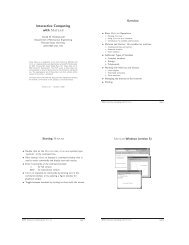"O Soul, Come Back!" A Study in The Changing Conceptions of The ...
"O Soul, Come Back!" A Study in The Changing Conceptions of The ...
"O Soul, Come Back!" A Study in The Changing Conceptions of The ...
You also want an ePaper? Increase the reach of your titles
YUMPU automatically turns print PDFs into web optimized ePapers that Google loves.
SOUL AND AFTERLIFE 391<strong>of</strong> Mount T'ai reigns supreme. <strong>The</strong> hun-soul is said to be either "return<strong>in</strong>g"or "belong<strong>in</strong>g" to Mount T'ai.72 It may be recalled thatheaven was now populated by the hsien immortals; it was no longera place to which the hun-souls could return. For the Han Ch<strong>in</strong>ese,therefore, Mount T'ai was the highest place imag<strong>in</strong>able, secondonly to heaven. Strictly speak<strong>in</strong>g, however, the hun-souls could noteven ascend the central peak <strong>of</strong> that sacred mounta<strong>in</strong> because it hadalso been transformed <strong>in</strong>to a meet<strong>in</strong>g place between the emperorand the hsien immortals. <strong>The</strong> hun-souls could only travel to Liangfu,the capital <strong>of</strong> the underworld <strong>in</strong> which the Lord <strong>of</strong> Mount T'aioperated his central adm<strong>in</strong>istration. It may be further noted that <strong>in</strong>Han popular culture, Mount T'ai itself, especially its peak, was asymbol <strong>of</strong> life and immortality whereas Liang-fu was that <strong>of</strong> death.However, the simple fact that Liang-fu was not only located <strong>in</strong> thevic<strong>in</strong>ity <strong>of</strong> Mount T'ai but also fell under the jurisdiction <strong>of</strong> the prov<strong>in</strong>cebear<strong>in</strong>g the name <strong>of</strong> the holy mounta<strong>in</strong> gradually gave rise towidespread confusion <strong>in</strong> Han popular beliefs about the afterlife.With the prov<strong>in</strong>ce bear<strong>in</strong>g the name <strong>of</strong> Mount T'ai <strong>in</strong>extricably confusedwith the mounta<strong>in</strong> itself, texts from the second century A.D. on<strong>of</strong>ten speak <strong>of</strong> the departed hun-souls as if they were to "return" tothe holy mounta<strong>in</strong>. But it is important to po<strong>in</strong>t out that <strong>in</strong> allprobability the orig<strong>in</strong>al conception was that the hun-soul <strong>of</strong> the newlydead would go to the Liang-fu hill <strong>in</strong> T'ai-shan prov<strong>in</strong>ce, <strong>in</strong> orderto register its name with the underworld government.F<strong>in</strong>ally, a word about the p 'o soul is <strong>in</strong> order. S<strong>in</strong>ce the hun-soulnow went to the underworld <strong>in</strong>stead <strong>of</strong> heaven, what happened tothe p 'o? It is <strong>in</strong>terest<strong>in</strong>g to observe that the p 'o was under the care <strong>of</strong>a separate department <strong>of</strong> the underworld government. Accord<strong>in</strong>g toTung-fang Shuo, the court jester <strong>of</strong> Emperor Wu's time, the <strong>of</strong>fice<strong>in</strong> charge <strong>of</strong> the dead is called po tM. Clearly, p'o and po share thesame etymological root; the name po may well have been derived72Hou Han shu &fi (Pek<strong>in</strong>g: Chung-hua shu-chui, 1965), 90.2980. It is important topo<strong>in</strong>t out that here the fragment <strong>of</strong> the Hsiao-ch<strong>in</strong>gyiuan-shen ch'i preserved <strong>in</strong> the Po-wu chih(see note 69 above) is also quoted by the T'ang commentator to support the statement <strong>of</strong> theHou Han shu. <strong>The</strong> Hou Han shu text says: "<strong>The</strong> hun-soul (hun-shen 4Et) <strong>of</strong> the dead returns toMount T'ai, " and the commentary, quot<strong>in</strong>g Po-wu chih, says: "Mount T'ai, the Grandson <strong>of</strong>the Heavenly God, is responsible for summon<strong>in</strong>g the human hun-souls" (90.2981). <strong>The</strong> twopassages agree with each other exactly.















